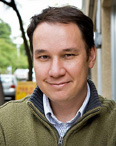Backstory
Authors tell you what inspired their work
Jamie Ford, Author of "Hotel on the Corner of Bitter and Sweet"

On a foggy February morning in 1983, fourteen people were gunned down at the Wah Mee club in Maynard Alley, just shy of South King Street in Seattle's Chinatown. It was the worst mass-murder in Washington State history.
The Wah Mee was actually a back-room gambling parlor, like the smoke-filled poker room romanticized in the movie Rounders, only nicer — an establishment that had been tolerated, even patronized, by local officials for decades. It was also where my grandparents first met, a lifetime before the "Wah Mee Massacre." My grandfather had been a croupier and my grandmother was a coat-check girl. Those were the economic realities of the time, so I'd been told growing up. An "Oriental" had three job options in the 30's: restaurant, laundry, or a gambling parlor. Take your pick.
In the months following the massacre, the shooters were captured and convicted. Families tried to heal. But Chinatown itself began to wither as if on life support. It was as though the shooters had murdered an entire community.
Almost overnight, Chinatown had become a scurrilous place where "decent people" didn't go — not for dim sum or tea, not for sightseeing, not on your life.
Three teens were murdered on the well-heeled Bainbridge Island, just across the water, in what appeared to be a botched drug deal. It made the national press, even tabloid shows like A Current Affair ran the story of the mysterious killings that to this day remain unsolved. But did that stop the development of million dollar homes? Hardly.
It was as if the murders in Chinatown validated a hidden belief, perhaps a leftover prejudice from forty years earlier. I'm not sure of the real reason, that's for sociologists to figure out. All I can tell you is that I watched Chinatown fall into decay over the next fifteen years. It's vibrancy, its pulse, seemed to slow down, mirroring the decline of my grandparents. And when they died, I wondered if Chinatown would just die along with them. Businesses had failed and buildings began to take on that gaunt, unoccupied look. Chinatown had become scar tissue on the glorious body of Seattle, now brimming with nouveau riche, courtesy of Microsoft and Amazon. I felt as though my childhood memories had been cremated and scattered.
My debut novel, Hotel on the Corner of Bitter and Sweet, delves into the Japanese Internment set in the 1940s, but half of the narrative is set in Chinatown in the mid-80s, listing heavily to one side and desperate to keep afloat. Perhaps as an unintended metaphor for the emotional state of my main character, but selfishly, I wanted to shine a light on a place that was once the cultural heart of Seattle — from Japantown, to Chinatown, to the once famous jazz clubs of South Jackson. I hoped that in some small way, I might draw attention to this slice of history before it was completely paved over — before my favorite Chinese bakery turned into a Starbucks. They might try to sell mooncakes with their lattes, but somehow it wouldn't be the same.
Despite my melancholy, the International District keeps fighting. If you visit the Emerald City anytime soon, you'll see that a few businesses are growing. Reinventing in a good way. Embracing the future, without running from the past. You can see it in Uwajimaya Village and in the new Wing Luke Asian Museum. Even at the tearoom of the Panama Hotel, which is quite lovely.
But the Wah Mee is still there, boarded up and untouched. You can find it if you know where to look. There's a wall in the alley made of frosted glass blocks but one is clear enough to peer inside. Nothing has changed; the club is still there, waiting for someone to chase away the ghosts.
Jamie Ford is the great-grandson of Nevada mining pioneer Min Chung, who emigrated from Kaiping, China, to San Francisco in 1865, where he adopted the Western name "Ford," thus confusing countless generations. Ford is an award-winning short-story writer, an alumnus of the Squaw Valley Community of Writers, and a survivor of Orson Scott Card's Literary Boot Camp. Having grown up near Seattle's Chinatown, he now lives in Montana with his wife and children. Hotel on the Corner of Bitter and Sweet is his debut novel. To learn more, please visit his website.

